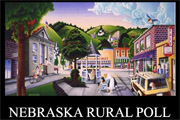Agricultural Economics, Department of

Nebraska Rural Poll
Date of this Version
2021
Document Type
Article
Citation
Nebraska Rural Poll, Research Report 21-1 (September 2021), 49 pages
Institute of Agriculture and Natural Resources, University of Nebraska-Lincoln
Also available at http://ruralpoll.unl.edu/pdf/21pandemicimpacts.pdf
Abstract
Most rural Nebraskans felt various impacts from the pandemic. While many rural Nebraskans had someone in their household that quarantined because of possible coronavirus exposure or who contracted COVID-19, most have friends or family in their community that quarantined or contracted the virus. Many rural Nebraskans also have friends or family both inside and outside their community who were hospitalized as a result of COVID-19 or who died as a result of it.
Most rural Nebraskans say the following were affected a fair amount or a great deal by the pandemic: their socialization with others, their life overall, and their company/workplace. Conversely, most rural Nebraskans say their physical health, their financial health and their mental health were either not at all impacted or not much. Some groups were more likely to report having these aspects of their lives affected by the pandemic. Residents of the Northeast region are more likely than persons living in other regions of the state to say the following aspects have been impacted at least a fair amount by the pandemic: their life overall, their mental health, and their physical health. And, persons living in or near larger communities are more likely than persons living in or near smaller communities to say the following items were affected at least a fair amount by the pandemic: their life overall, their mental health, their physical health, their financial health and their socialization with others.
Work patterns were also impacted. While 16 percent of employed rural Nebraskans worked from home some of the time before the coronavirus outbreak, this increased to 28 percent when they took the survey in the spring and early summer. If they had a choice after the outbreak, just over one-third would like to work from home at least some of the time.
Various economic impacts were also felt by rural Nebraskans. Two out of ten rural Nebraskans say someone in their household had a loss of income during the past year, 16 percent said someone in the household had their hours reduced and 16 percent had someone receive paid time off from their employer if a person in the household was infected with COVID-19. More of these impacts were seen in their community. Almost one-third of rural Nebraskans had friends or family in their community who had a loss of income or had their hours reduced. Almost three in ten had friends or family in their community that reduced the hours of operation of their business and just over one-quarter had friends or family in their community that were temporarily laid off.
Certain groups are more likely to have experienced these economic impacts. Persons with the lowest household incomes are more likely than persons with higher incomes to say someone in their household experienced the following in the past year: were temporarily laid off, lost their job, and had hours reduced. And, persons living in or near larger communities are more likely than persons living in or near smaller communities to say friends or family in their community experienced many of the items listed: were temporarily laid off, lost their job, changed jobs, retired early, had hours reduced, had a loss of income and returned to work after being laid off temporarily. However, persons living in or near the smallest communities are the group most likely to say friends or family in their community closed a business.
Consumer habits were also impacted. Many rural Nebraskans engaged in the following activities more often during the pandemic: had food from a restaurant delivered or used curbside pickup (44%), used videoconferencing to visit with friends or relatives (44%), shopped online (other than groceries) (38%), and had groceries delivered or used curbside pickup (34%). And, most rural Nebraskans report being likely to shop online (other than groceries) and use self-service banking options going forward. Many also say it will be likely for them to videoconference with friends/relatives, order food from a restaurant for delivery or curbside pickup and to order groceries by delivery or curbside pickup.
Not many rural Nebraskans report significant limitations from their home Internet service on their ability to do various activities, such as work at home or participate in online K – 12 learning. Less than one in ten report being limited significantly or not being able to do each of the activities listed.
Included in
Agribusiness Commons, Agricultural and Resource Economics Commons, Civic and Community Engagement Commons, Community-Based Research Commons, COVID-19 Commons, Demography, Population, and Ecology Commons, Entrepreneurial and Small Business Operations Commons, Place and Environment Commons, Public Affairs, Public Policy and Public Administration Commons, Regional Economics Commons, Rural Sociology Commons

